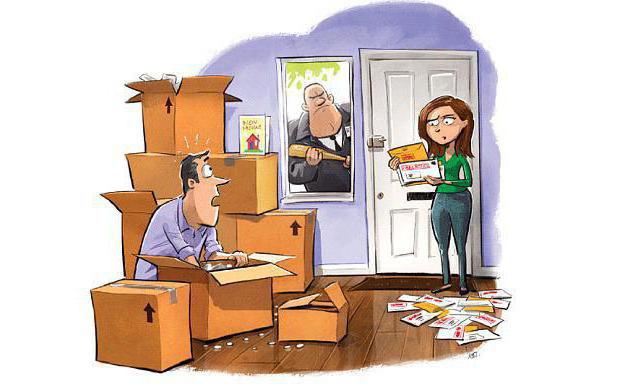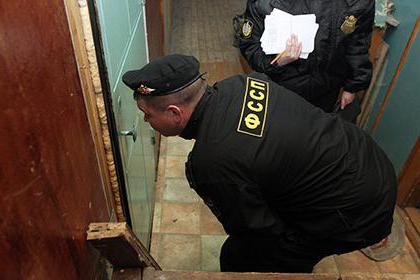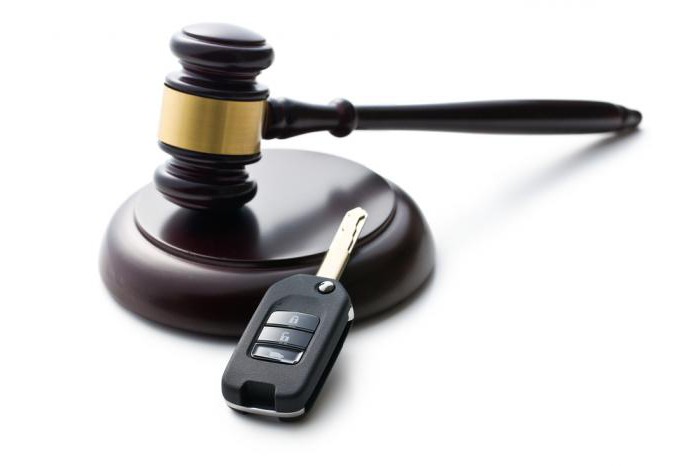Today, there are frequent cases when, after a court decision, funds are collected from the debtor, bailiffs, executors deal with these issues. If during the allotted time the defendant did not challenge the decision, then he is waiting seizure of property and bank accounts. But the debtor should know what property is not subject to arrest by bailiffs, this will help protect their rights.

Housing
Many people mistakenly believe that for debts they can lose a roof over their heads, but this is a big mistake. In fact, the only housing and land are not subject to arrest, but which a private house is built if it is the sole property of the debtor.
Another thing is if the debtor has other residential property in the property. You can impose an arrest on her. But there are significant limitations. If the property is located in shared ownership and the defendant is not the sole owner, the bailiffs will not be able to seize the property. Another nuance is that the value of real estate should be comparable to the size of the debt. Here we are not talking about mortgage debts, because in this case housing is pledged to the bank and will be withdrawn if the borrower fails to fulfill its obligations under the loan agreement.
But this does not mean that the arrest cannot be imposed on other personal items, household items, furniture and appliances. Next, you should carefully consider what property is not subject to arrest by bailiffs.
Personal items
Here, each debtor has many questions, and each of them requires individual consideration. First of all, personal belongings are not subject to arrest, these include shoes, clothes, personal hygiene products, and food. This does not apply to luxury goods and jewelry, they can be withdrawn, but only if their value corresponds to the size of the debt.

There are still quite a lot of questions. Let's say whether high-value clothing, such as a fur coat, can be removed. Actually no, they cannot, because it is a piece of clothing, but if something like this happened, the debtor has the right to file a lawsuit with the court and return the property back. But about this procedure below.
Furniture
An exciting question: what can bailiffs remove from furniture? The legislation does not provide for the seizure of such property, especially if the apartment has old furniture. If the bailiffs threaten to describe the interior, this does not apply to furniture. And, for example, antiques, luxury goods, expensive paintings and much more can be removed, if their value is close to the size of the debt. In addition, the task of bailiffs is to seize and sell the property of the debtor, and old furniture is not of particular value to them.
Appliances
This is also a moot point. Bailiffs cannot seize household appliances, without which it is difficult for a person to exist. First of all, these are cookers; they are necessary in everyday life for cooking. Without them, it is difficult to provide full-fledged nutrition to the family, which means that citizens' rights are violated, which does not comply with the law. The same thing - a home refrigerator, without which it is impossible to store food necessary for a person daily.

But this rule does not apply to other items of household appliances, such as a microwave oven, washing machine, slow cooker, TV. According to the bailiffs, these are luxury goods, and a ban was not imposed on their arrest.But do not despair, it is enough to challenge this decision in court if you can prove that the seizure of property will drastically worsen the position of the debtor. By the way, if the house, for example, has two stoves or a refrigerator, several televisions, then they can be removed.
Gifts, prizes and awards
Gifts and prizes are the property of the debtor, but it is impossible to seize him. As well as for state awards, prizes and more. But this does not apply to the inheritance, that is, if the debtor inherited any property and it passed into his property, then he can be arrested for debts. It is impossible to realize the means necessary for the existence of a disabled person, such as strollers and cars.
State awards are a separate issue, they were received for any merit, and third parties have no right to claim them. Accordingly, the bailiffs cannot seize them for the purpose of subsequent sale.

Professional subjects
The property which is necessary for professional activity is not subject to arrest. That is, property that generates income. For example, if the defendant is working in a taxi, then it is impossible to seize his car, or he is a musician, and he needs a musical instrument. An exception is the high cost in excess of 100 minimum wages. But to withdraw it, respectively, is possible only if the amount of debt corresponds to the value of the item.
It is impossible to withdraw from the debtor the property that his children use, such as a computer. If the child is a schoolboy, then this subject is necessary for him in school and cannot be subject to seizure.

Agricultural property
For a resident of the countryside, the main source of food is their own farm. Bailiffs cannot sell livestock, the products it provides, and feed for its maintenance. This is the case if it is not about entrepreneurial activity. In simple words, if the debtor keeps the compound not for sale, but for his own use, then it is impossible to withdraw it. The same goes for the seeds needed for the next sowing season.
In some cases, vehicles cannot be removed if it is necessary for movement from the countryside to, for example, a place of work. Buildings and facilities for livestock are also not subject to arrest.
Untouchable items include fuel, such as firewood, which is used to heat the room and is a source of cooking.

Cash
The first thing that is seized is bank accounts. Credit cards are prohibited, because they are not the property of the defendant, but belong to the bank, respectively, it is impossible to arrest them. A salary account can be arrested, but not completely, the maximum amount is 50%, and the balance cannot be less than the minimum wage in the region. But the bailiff's duties do not include finding out where and why the funds are coming into the debtor's account. To lift the ban, you need to contact the bailiffs service and document that it is a salary.
Children's allowances, alimony, subsidies and other payments can also not be arrested. Similarly, you need to prepare documents and contact the bailiff service. The arrest will be lifted, and the debtor can receive previously seized funds.
The cash found during the inventory of the property may be withdrawn, but only partially, the remaining amount should not be less than the cost of living. And accordingly, can not be more than the amount of debt.
Other property
There is other property that is not subject to arrest. These are religious objects. These include books, icons, and other attributes, as well as items that do not belong to the debtor, but to other family members living with him on the same living space. But this fact will need to be proved in court.
A controversial issue is the property of the spouses. On the one hand, all property is jointly acquired, including debts.For example, if the defendant took a loan in the marriage, but could not repay it, his wife was not a guarantor or co-borrower, then the recovery will be at the expense of joint property. The only exception is the circumstance if one of the spouses did not know about the loan of funds and did not use them, which would be difficult to prove.
There are many nuances about what property is not subject to arrest by bailiffs. Even if the law does not provide a ban on the sale of property, but the debtor really needs it, it is more reasonable for him to file a lawsuit with the court and present evidence. Then he may be able to defend him.

Illegal actions of the bailiff
There are frequent cases when the bailiff tries to recover the debt from the defendant at any cost, and at the same time he is of little interest, whose property was arrested, even if it was acquired by third parties. Many legally illiterate debtors are ready to give even those items that no one has the right to take. But this is far from right.
First, the bailiff comes to the defendant’s house and seizes his property, that is, the owner loses the right to dispose of his property, he cannot sell, donate, destroy it. If the defendant does not agree with the actions of the bailiff, he has the right to appeal to the court. This also applies to cases where the owner does not agree with the assessment of the value of the item. Then an examination is appointed, and according to its conclusion, the final price is determined.
In general, in case of any disagreement, you should not be afraid to go to court. The state duty for the lawsuit is not charged, the procedure does not take much time, but this will provide an opportunity to legally assert their rights.
Conclusion
Every citizen, especially a debtor, must know exactly what property is not subject to arrest by bailiffs. In addition, it is possible to resolve the issue without arrest, for example, go to court with a request for a deferment or installment plan. Or challenge the actions of the bailiffs. These measures will not help get rid of debt, but will help to gain time, collect the necessary amount and pay off the debt. Only it is impossible to realize the property that has been described. It should also be borne in mind that if the amount is less than 3,000 rubles, then no one will be able to seize the debtor's property or his money.






